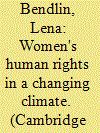| Srl | Item |
| 1 |
ID:
163544


|
|
|
|
|
| Summary/Abstract |
Transportation is the largest contributor to greenhouse gas emissions in the energy sector, which, in turn, is the largest contributor in Brazil. The way different policies mitigate CO2 emissions in the short, medium, and long-term is an ongoing research topic. Four potential policies for light vehicle fleet are investigated: (i) energy efficiency; (ii) modal change and regulatory management; (iii) renovation of the fleet; and (iv) biofuel increase. A system dynamics model is developed to estimate the delay in fleet turnover and its CO2 emissions change during the 1980–2050 period. The results indicate a rebound effect in the long-term when an objective of renovating the fleet is realized. Only if more stringent terms are considered will this policy contribute to further mitigate CO2 emissions in the long run. Results also demonstrate a longer-term perspective to energy efficiency and modal change policies, indicating the need for mandatory CO2 emission targets, unseen in the country at the present time. A biofuel increase strategy provides CO2 reduction in the short-term, and it is advisable this strategy be adopted alongside the other ones.
|
|
|
|
|
|
|
|
|
|
|
|
|
|
|
|
| 2 |
ID:
137150


|
|
|
|
|
| Summary/Abstract |
A women's rights perspective can inform and structure research on climate policy impacts on women. To date, climate policy analysis has mostly considered women as agents of climate protection, that is, objects of mitigation policies, rather than subjects in their own right. However, climate change mitigation involves direct and indirect distributive effects depending on which sectors are involved, which instruments are chosen and how funds are obtained and allocated. Since gender roles impact on individual livelihoods and activities, distributive effects are likely to be gendered. This paper suggests that women's human rights can be used as a framework for research aiming to fill this gap. They provide a well-developed, tested range of criteria for gender justice. Such assessments would allow for a more systematic and comprehensive understanding of the gendered distributive effects of climate policies, notably with regard to the particularly understudied situation in the industrialized world.
|
|
|
|
|
|
|
|
|
|
|
|
|
|
|
|